orm25
Jr. Member
- Oct 29, 2012
- 77
- 95
- Detector(s) used
- Garrett Ace 250, Garrett AT Pro, Vulcan 360 Pinpointer, Geotech Barracuda Pi, Minelab Sovereign GT, Minelab Explorer 2, bounty hunter pinpointer,
- Primary Interest:
- All Treasure Hunting
Hey guys,
Do your coins have that green corrosion on them? Well you would probably want to get rid of it to make your coin look nicer wouldn't you?
So here's a way to remove that horrible, ugly corrosion from your silver.
All you will need: is some vinegar (better if more concentrate), a container, a soft brush (eg. toothbrush) and of course something silver that has that green corrosion.
First things first, find a coin or some silverware containing green corrosion on it.
Eg: A 1/24 thaler coin with minor green corrosion on it
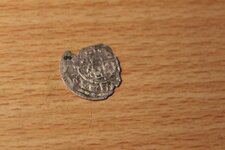
Then, just fill your container with some vinegar (doesn't have to be too much), and drop the silver in.
Let it sit for a couple of hours in the vinegar, but best if it sits over night.
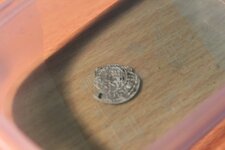
Once you think its ready (corrosion should have turned a brown color), remove the silver object from the vinegar and brush with a toothbrush or something like that.
If the corrosion is not gone completely, put your silver back into the vinegar until you think it achieved its look.
Tadaaa!! Your green corrosion should have decreased and the silver object should look more clean.
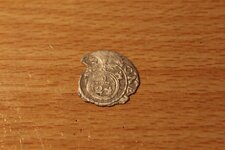
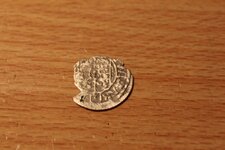
The good thing about using vinegar is, that it's a weak acid and will not do severe damage to silver. But beware! Do not put anything made of copper in if it's something you don't want to ruin. Vinegar will make it shiny but it will also remove the details on it.
Do your coins have that green corrosion on them? Well you would probably want to get rid of it to make your coin look nicer wouldn't you?
So here's a way to remove that horrible, ugly corrosion from your silver.
All you will need: is some vinegar (better if more concentrate), a container, a soft brush (eg. toothbrush) and of course something silver that has that green corrosion.
First things first, find a coin or some silverware containing green corrosion on it.
Eg: A 1/24 thaler coin with minor green corrosion on it

Then, just fill your container with some vinegar (doesn't have to be too much), and drop the silver in.
Let it sit for a couple of hours in the vinegar, but best if it sits over night.

Once you think its ready (corrosion should have turned a brown color), remove the silver object from the vinegar and brush with a toothbrush or something like that.
If the corrosion is not gone completely, put your silver back into the vinegar until you think it achieved its look.
Tadaaa!! Your green corrosion should have decreased and the silver object should look more clean.


The good thing about using vinegar is, that it's a weak acid and will not do severe damage to silver. But beware! Do not put anything made of copper in if it's something you don't want to ruin. Vinegar will make it shiny but it will also remove the details on it.


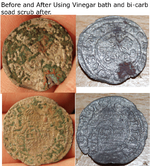
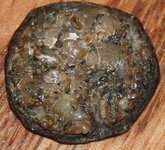
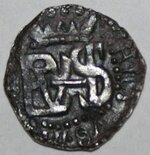
 as for cleaning copper coins with Olive Oil, it doesn't clean them, it just brings out the patina better.
as for cleaning copper coins with Olive Oil, it doesn't clean them, it just brings out the patina better.



